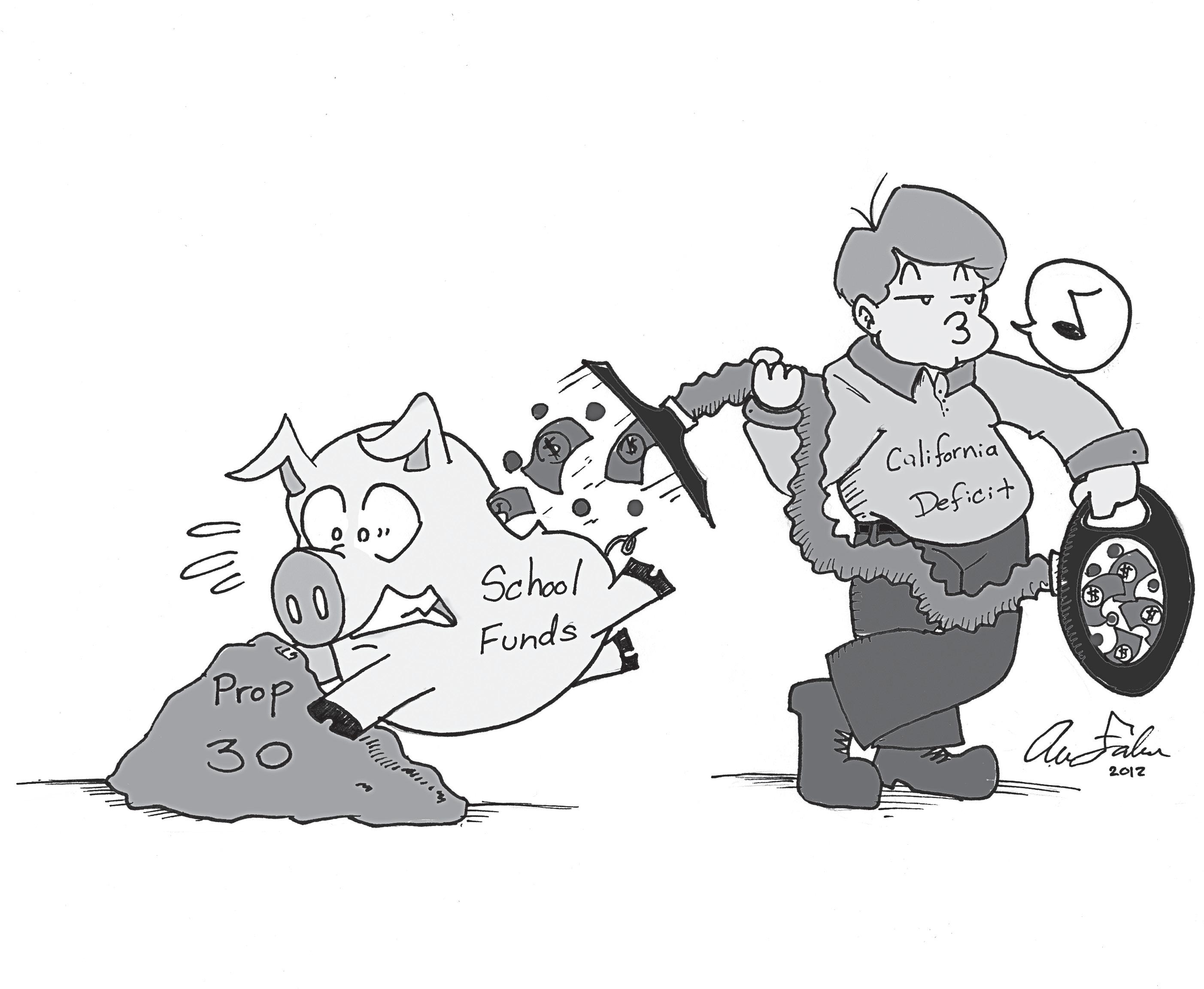
6 minute read
Vote ‘YES’ on Prop 30
Every ballot counts, especially these days
Attack advertisements. Policy discussions. Debates, rinse, and repeat.
Advertisement
It is that time yet again. The United States presidential election has rolled around and the question of Mitt Romney or Barack Obama is now at the front of U.S. politics.
As Karl Marx once said, “The oppressed are allowed once every few years to decide which particular representatives of the oppressing class are to represent and repress them.”
We have come upon that time.
But many may be asking, “How are we oppressed?”
Simply put, people often take care of their own interests first, and the interests of the politicians are not in the interest of the majority of the working class.
In 2010, the average net worth of U.S. senators was $2.56 million, and 47 percent of the House of Representatives were millionaires, according to the Center for Responsive Politics.
Worst Case Scenario
If voters reject the tax initiative in November, the midyear trigger cuts will be effective Jan. 1, 2013:
• $5.4 billion from Prop. 98
• $250 million from UC
• $250 million from CSU
• $50 million from Development Services
• $20 million from granta to Local Police Department
• $10 million from Department of Forestry and Fire Protection
• $17.6 million from various other programs, including flood protection, state parks, and the Department of Justice California community colleges, if the November initiative fails, would lose:
• $209.9 million approved in budget ($50 million in growth/restoration and $159.9 million fir deferral payments
• $338.6 million of additional base revenue (or nearly 7.3%)
Source: The LACCD Final Budget 2012-13
It’s a real shame that getting an education in California is so hard these days.
So who is to blame for this crisis?
At this point, it really doesn’t matter.
We just desperately need money for our schools.
Over the past few years, California’s Department of Education has taken detrimental cuts to funding, severely crippling academic advancement in our state.
California is currently staring at an enormous $15.7 billion deficit that Gov. Jerry Brown is trying to alleviate with his new tax initiative, Proposition 30.
Numerous boards, committees, and organizations have focused their efforts to solving this growing deficit problem, but unfortunately their solutions seem superficial. Almost like applying a Band-Aid to a freely flowing, open wound.
If voters approve Brown’s Prop. 30 during this November election, they could cauterize this gaping gash that is bleeding our colleges dry.
The Los Angeles Times reports that the majority of Californians initially supported the initiative, but support has slightly dwindled since then.
If taxpayers back the initiative, that would raise sales tax by a quarter cent as well as raise income tax on earners of over $250,000 annually, for seven years.
Gov. Brown hopes that taxpayers will be able to generate $6 billion to $8 billion in revenue to complement the $8.3 billion the governor has already cut. This would finally get California out of the red, breaking even.
On the district level, the Los Angeles Community College District (LACCD), is finding itself with less and less every year.
In the LACCD’s 2012-2013 Final Budget, it outlines contingency plans for “worst case” and “best case” scenarios. Currently the district’s budget stands at $3.47 billion, with $46.6 million having been cut last year alone. College presidents have had to make cuts on their campuses in anticipation.
California voters need to support this initiative because these taxes are mere pennieson-the-dollar compared to the massive loss that will hit the LACCD and its students.
What we really need is educational reform, but for now Prop. 30 is California’s best shot at saving community colleges.
These cuts are putting students on the streets.
Last year, the LACCD reports having lost 5,800 students.
If this negative trend continues it will result in about 15,000 to 20,000 students being dropped from the LACCD within the next year, as stated in their budget.
Some arguments against Prop. 30 claim that this money would not go toward schools, but if this initiative does not pass, there won’t be much left of these schools.
The passing of Prop. 30 is essential to the survival of education in California and this crisis warrants a call to arms. Ignorance is the enemy and ballots are the bullets.
Student body governments need to support this initiative by rallying student voters and spreading the word.
Defend public education in California and vote ‘yes’ on Prop. 30.
By Austin Faber
That same year, the number of this country’s millionaires hit 3.1 million, according to the annual World Wealth Report from Merill Lynch and Capgemini.
Though these numbers have decreased slightly in the last few years, it still holds true that a large portion of our government comes from the upper class.
How can we logically expect the bosses to represent the interests of workers?
For those of the conservative persuasion, you will already disagree with these conclusions and be content with your decision.
For those of the liberal or possibly even far left, you now have to make a choice.
Would you abstain in protest of the system?
No, this is not the way to go. Regardless if you disagree with the current system, giving up the little power you have as workers would be a mistake.
Vote. Definitely vote. But that does not mean you have to vote for the two major parties.
You may feel the need to pick the lesser of two evils.
Rest your weary mind.
California’s electoral college members have consistently chosen Democratic candidates over the last two decades and beyond, according to the National Archives and Records Administration.
With your fears now stifled, another question arises.
Is a vote for a third party a waste of a vote?
A vote is never wasted, so long as you are voting with your conscience.
What is really important, though, are the propositions. These propositions have the potential to effect each and every student’s life. Even if you abstain from picking presidential candidates, the propositions should be given special consideration.
So get out and vote, exercise the power you have and be heard, and try and bring about some real change for once.
You fail the first test. The material is over your head. The professor’s teaching style and your learning style conflict. You work long hours to pay for school, and you can’t keep up. Life happens and you have to drop a class.
But you can’t drop without consequence.
A quietly announced change of deadline earns you a big, ominous “W” to forever remind you and admissions officers that you withdrew from a class.
This semester, a decision by the state of California shortened the drop deadline from Sept. 27 to Sept. 9 for all community colleges, allowing students only two weeks to drop without penalty of withdrawal.
A grade of “W,” or a withdrawal, counts as an attempt for that course and stays on your transcript forever, according to a press release on Pierce College’s website, Pulse Online.
Students who dropped late and were uninformed of the new deadline change will carry that ambiguous “W” with them as they apply to transfer schools, graduate schools and further education.
Though it does not affect grade point average, too many withdrawals may force admissions representatives to question a student’s determination and staying power, as my college counselor hastily reminded me after my first withdrawal.
And yet students were largely unaware of the new drop deadline.
It was announced just four days before the new deadline, and students were only notified by the brief Pulse Online news release on the school website.

The drop date was also listed in a tiny column in students’ online class schedules. But if students weren’t paying attention to sidebars they might have missed it.
The decision was made to “better assist students who are struggling to get into the classes that meet their educational goals,” according to “Sept. 9 is Drop Deadline for Fall” on Pulse Online.
“With budget cuts and filled-tocapacity classrooms, the state has determined that there just isn’t room for students to take classes over and over again without completion, or to sign up for a class they don’t intend to finish—ultimately taking a seat away from a more serious student.”


As we all know, sometimes life throws even the “more serious student” a curve ball.
For those emergency moments of panic and frustration, we deserve at least one month of adjustment in the beginning of a semester, especially for incoming students.
If we don’t get our choice of classes at a reasonable tuition, we at least deserve that safety net.
The state may try to assist us by making more seats available in a scant selection of course offerings, but they would better assist us by funding additional sections instead of taking away our safety net as we try to navigate the painful state of our current education system.








